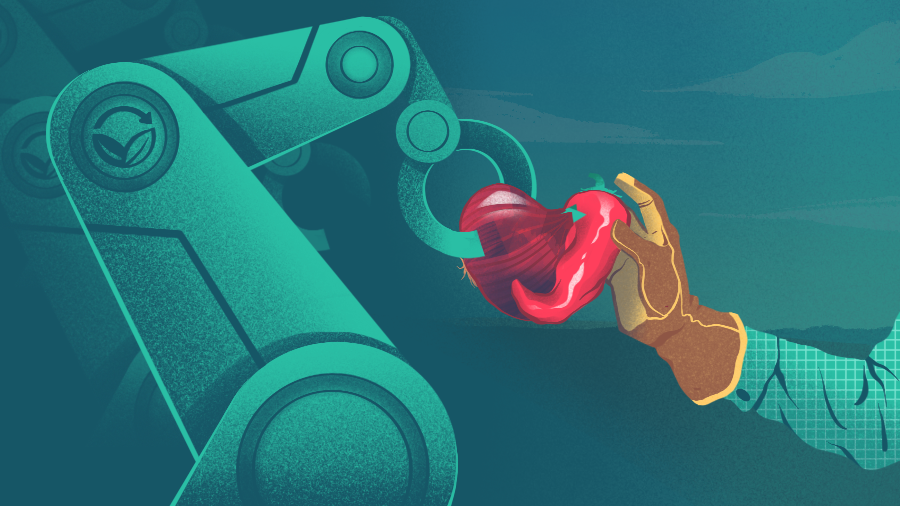Building a safe food supply chain from farm to table–that consumers also trust–is a challenge that startups are taking on.
Subscribe to the Crunchbase Daily
Experts told Crunchbase News that a sustainable food supply chain begins with the farmers, who are utilizing technologies, innovated by startups, to ensure their crops have a good start.
That can include planting the right seeds, using the right field, improving growing conditions, and harvesting and post-harvest practices. Then there is the trip to the grocery store or to the manufacturing plant where the crops become something else.
Among the factors affecting the food supply chain is manufacturers’ dependence on it, said Adam Wolf, co-founder of Arable. The San Francisco-based agricultural business intelligence tool performs in-field measurements and, as part of its offerings, tells farmers when crops are in need of water or nutrients.
He points to the example of Swedish oat milk-maker Oatly running out of supply in 2018.
“At one point, you couldn’t buy oats because they ran out,” Wolf said. “Manufacturers in niche areas like this are super small, but profitable. Where it goes wrong is when you want to double in size, but you have suddenly outstripped the supply chain. That, in turn, pushes things to farmers.”
Innovation on the farm
And that’s when farmers look to innovation. In the past five years, startups have increasingly turned their attention to the farm, and investors are following their lead. So far in 2020, investors have sunk $4.1 billion of venture-backed dollars into 413 agriculture technology deals, and over the last five years have made $17.7 billion in investments, according to Crunchbase data.

Among those 413 deals in 2020 are ThinkIQ and TeleSense, which each received funding last week.
Finistere Ventures co-founder and Partner Spencer Maughan led TeleSense’s $10.2 million Series B round of financing. The firm has been investing in the food supply chain since it was founded in 2005.
Maughan said the supply chain “has been fragile with COVID and changing consumer preferences,” as well as managing waste and quality.
That’s where TeleSense is focusing. The Sunnyvale, California-based company is using remote sensors to digitize the post-harvest grain supply chain. Once harvested, grain is good for about six to eight months, so it’s important for farmers to know the status of their harvest across all of their silos, TeleSense CEO Naeem Zafar told Crunchbase News.
Meanwhile, ThinkIQ, an Aliso Viejo, California-based company working on digital manufacturing transformation SaaS, raised $11.6 million in a Series A round led by Ecosystem Integrity Fund.
ThinkIQ also uses sensors, but to trace the manufacturing process in real time from raw materials to a finished product, said Doug Lawson, CEO of ThinkIQ, in an interview.
The data collected provides farmers with information to make smarter decisions about how crops are grown, transported and purchased. In some cases, ThinkIQ was able to boost yield from 50 percent to more than 90 percent without physically changing the growing process, he said.
For example, data led to a whole new type of gluten-free oats being grown. By following certain growth practices to deliver to the manufacturer, Lawson said it yielded a $30 million benefit to farmers per year.
“That is the power of information,” he added. “The adjustments the farmers needed to do were worthwhile and easy to do. Data dramatically improves economics and could even prevent recalls or detect them quickly. That has a huge impact and makes for a safer product.”
Environmental factors
A discussion about farming often leads to one about climate change.
Just this week, Cambridge, Massachusetts-based CIBO, a venture-backed technology company that delivers decision-ready insights on all U.S. cropland, announced the launch of CIBO Impact. This technology will enable farmers to generate and sell carbon credits from their regenerative farming practices on an annual basis, while also providing a marketplace for organizations and individuals to offset their carbon footprint by purchasing credits directly from American farmers.
“Growers are consistently looking at ways to differentiate their grains, and the environment is the newest way,” said Steele Lorenz, head of sustainable business at San Carlos, California-based Farmers Business Network. FBN is a farmer-to-farmer agronomic information network.
Agricultural entities in the U.S. emitted an estimated 698 million metric tons of carbon-dioxide equivalent in 2018. That included 12.3 percent as carbon dioxide, 36.2 percent as methane and 51.4 percent as nitrous oxide, according to a U.S. Department of Agriculture report.

Weather is also a factor. TeleSense’s Zafar pointed to the recent storms that damaged grain bins at the Heartland Co-Op grain elevator in Luther, Iowa.
“Rather than the metal silos, farmers are now using what they call silo bags that are the equivalent of two football fields long,” he said. “With the wet winter rains in the Midwest, they will need new innovation to preserve their grains.”
The environment is on the forefront of Julia Collins’ mind, especially when she became a mother and wanted to feed her son healthy food that was also climate-friendly.
“I started to look for ways to relate carbon impact with the food supply,” said Collins, who founded regenerative food platform Planet FWD in 2019. “We aim to use the power of the food system to help with carbon removal. The government is pushing for net zero over the next few decades, but you have to draw it down first.”
She learned about regenerative farm practices, such as those that improve soil health, and created a SaaS tool for climate-friendly sourcing. It connects farmers with brands that want to create climate-friendly products.
Taking a cue from that, Collins is creating an edible cracker, under Planet FWD’s Moonshot Snacks brand, that is sourced from wheat grown by farmers using regenerative agricultural practices. The product will launch later this year.
“We believe there are many farmers using tools that sequester carbon, and they should be rewarded,” she said. “Only 5 percent of cropland is being managed for soil heath, and we want to identify those that do it and pull it all the way through to the brand and the consumer.”
Meanwhile, both growers and buyers face a challenge in connecting supply and demand, Lorenz said. FBN provides a way for farmers growing crops, even in other countries, to find useful information along the supply chain.
“When we look further into the future, we will see innovation, such as remote sensing and ways to connect growers to platforms where they can verify environmentally friendly crops, such as grain,” he added. “We continue to be impressed at how growers are investing in the future of farming every day.”
Illustration: Dom Guzman

Stay up to date with recent funding rounds, acquisitions, and more with the Crunchbase Daily.






![Illustration of a guy watering plants with a blocked hose - Global [Dom Guzman]](https://news.crunchbase.com/wp-content/uploads/quarterly-global-3-300x168.jpg)
67.1K Followers